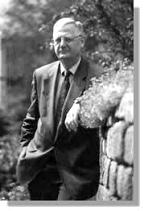The riddle of Eberhard Jüngel
Eberhard Jüngel is one of the two best theologians in the world today (the other is of course Wolfhart Pannenberg). And I might as well come out of the closet and admit that, in contemporary theology, there is no one I like better than Eberhard Jüngel. Unfortunately, though, he is also by far the most difficult theological thinker in recent times. He has his own unique and highly refined conceptuality, which draws especially on the philosophy of Heidegger, but also on the theology of Barth, the philosophy of Hegel, and the hermeneutic of Ernst Fuchs and Gerhard Ebeling. At times it can take an extraordinary effort to penetrate this conceptuality and to grasp Jüngel’s point. In addition, Jüngel has never shown even the slightest interest in English-language theology, and he is even said to have boasted that his own (exceedingly German) theology is untranslatable into English. (Happily, though, translators like Darrell Guder, John Webster and Jeffrey Cayzer have proved him wrong.)
Unfortunately, though, he is also by far the most difficult theological thinker in recent times. He has his own unique and highly refined conceptuality, which draws especially on the philosophy of Heidegger, but also on the theology of Barth, the philosophy of Hegel, and the hermeneutic of Ernst Fuchs and Gerhard Ebeling. At times it can take an extraordinary effort to penetrate this conceptuality and to grasp Jüngel’s point. In addition, Jüngel has never shown even the slightest interest in English-language theology, and he is even said to have boasted that his own (exceedingly German) theology is untranslatable into English. (Happily, though, translators like Darrell Guder, John Webster and Jeffrey Cayzer have proved him wrong.)
Anyway, all this helps to explain why Jüngel has been largely neglected in English-language scholarship—especially compared to the attention that his fellow countrymen, Pannenberg and Moltmann, have received. Both Pannenberg and Moltmann engage seriously with English and American theology, and they both write in a relatively straightforward way. So they are more obvious dialogue-partners for those of us who don’t live in Germany.
Nevertheless, I think Jüngel is well worth the effort. I don’t think any other theologian since Barth has wrestled more profoundly with the doctrine of God and with the theological significance of the death of Jesus. The goal of all Jüngel’s work is to “think God”—i.e., to “think God” as “the event that happened in the death of Jesus.” This may not be an easy task; but it is nevertheless the task of theology.







Post a Comment